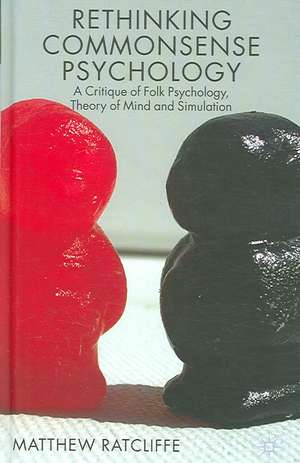Rethinking Commonsense Psychology: A Critique of Folk Psychology, Theory of Mind and Simulation: New Directions in Philosophy and Cognitive Science
Autor Matthew Ratcliffeen Limba Engleză Hardback – 8 noi 2006
Din seria New Directions in Philosophy and Cognitive Science
- 15%
 Preț: 497.31 lei
Preț: 497.31 lei -
 Preț: 389.88 lei
Preț: 389.88 lei -
 Preț: 392.37 lei
Preț: 392.37 lei -
 Preț: 392.37 lei
Preț: 392.37 lei - 15%
 Preț: 644.95 lei
Preț: 644.95 lei - 15%
 Preț: 704.69 lei
Preț: 704.69 lei -
 Preț: 387.75 lei
Preț: 387.75 lei - 15%
 Preț: 646.11 lei
Preț: 646.11 lei -
 Preț: 386.81 lei
Preț: 386.81 lei - 15%
 Preț: 641.38 lei
Preț: 641.38 lei - 8%
 Preț: 591.69 lei
Preț: 591.69 lei -
 Preț: 450.33 lei
Preț: 450.33 lei - 15%
 Preț: 692.24 lei
Preț: 692.24 lei -
 Preț: 349.91 lei
Preț: 349.91 lei - 15%
 Preț: 695.85 lei
Preț: 695.85 lei - 18%
 Preț: 722.75 lei
Preț: 722.75 lei - 18%
 Preț: 722.26 lei
Preț: 722.26 lei - 18%
 Preț: 727.18 lei
Preț: 727.18 lei - 18%
 Preț: 782.42 lei
Preț: 782.42 lei - 15%
 Preț: 696.50 lei
Preț: 696.50 lei - 15%
 Preț: 586.70 lei
Preț: 586.70 lei -
 Preț: 388.13 lei
Preț: 388.13 lei -
 Preț: 389.88 lei
Preț: 389.88 lei - 15%
 Preț: 584.43 lei
Preț: 584.43 lei -
 Preț: 394.87 lei
Preț: 394.87 lei -
 Preț: 388.72 lei
Preț: 388.72 lei -
 Preț: 389.70 lei
Preț: 389.70 lei
Preț: 698.21 lei
Preț vechi: 821.42 lei
-15% Nou
Puncte Express: 1047
Preț estimativ în valută:
133.60€ • 139.22$ • 110.62£
133.60€ • 139.22$ • 110.62£
Carte tipărită la comandă
Livrare economică 03-17 aprilie
Preluare comenzi: 021 569.72.76
Specificații
ISBN-13: 9780230007109
ISBN-10: 0230007104
Pagini: 271
Ilustrații: XI, 271 p.
Dimensiuni: 140 x 216 x 20 mm
Greutate: 0.45 kg
Ediția:2007
Editura: Palgrave Macmillan UK
Colecția Palgrave Macmillan
Seria New Directions in Philosophy and Cognitive Science
Locul publicării:London, United Kingdom
ISBN-10: 0230007104
Pagini: 271
Ilustrații: XI, 271 p.
Dimensiuni: 140 x 216 x 20 mm
Greutate: 0.45 kg
Ediția:2007
Editura: Palgrave Macmillan UK
Colecția Palgrave Macmillan
Seria New Directions in Philosophy and Cognitive Science
Locul publicării:London, United Kingdom
Cuprins
Commonsense Psychology, Theory of Mind and Simulation Where is the Commonsense in Commonsense Psychology? The World We Live in Letting the World do the Work Perceiving Actions The Second Person Beliefs and Desires The Personal Stance
Recenzii
'Rethinking Commonsense Psychology offers the to-date most detailed and sophisticated critique of the wide-spread philosophical dogma according to which humans understand each other by means of 'folk psychology'. Drawing on a number of philosophical traditions as well as recent results in psychology and neuroscience, Ratcliffe not only refutes the dogma, but replaces it with a novel view. Rethinking Commonsense Psychology will be required reading for philosophers of psychology, developmental psychologists and cognitive scientists alike.' - Professor Martin Kusch, Department of History and Philosophy of Science, University of Cambridge
'Ratcliffe covers every detail of a thorough repudiation of standard accounts of how we understand other people. Folk psychology is dead and we can forget it since, as Ratcliffe shows, we clearly do not need it for purposes of understanding others or even explaining how we understand others. Ratcliffe has eliminated FP, not in the way that some hard-line reductionists would want it eliminated, but by showing its irrelevancy. The hard-line reductionists no longer need to worry about FP; at the same time, Ratcliffe provides them with much more serious things to worry about, since reductionism is dead too.' - Shaun Gallagher, Chair and Professor of Philosophy, University of Central Florida, editor of Phenomenology and the Cognitive Sciences
'Ratcliffe covers every detail of a thorough repudiation of standard accounts of how we understand other people. Folk psychology is dead and we can forget it since, as Ratcliffe shows, we clearly do not need it for purposes of understanding others or even explaining how we understand others. Ratcliffe has eliminated FP, not in the way that some hard-line reductionists would want it eliminated, but by showing its irrelevancy. The hard-line reductionists no longer need to worry about FP; at the same time, Ratcliffe provides them with much more serious things to worry about, since reductionism is dead too.' - Shaun Gallagher, Chair and Professor of Philosophy, University of Central Florida, editor of Phenomenology and the Cognitive Sciences
Notă biografică
MATTHEW RATCLIFFE is Reader in Philosophy at Durham University, UK.
